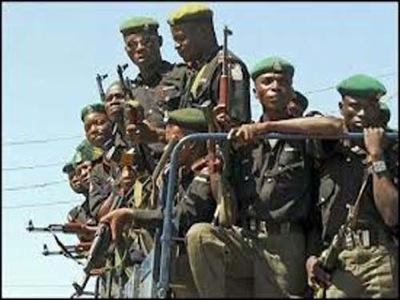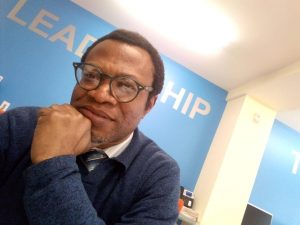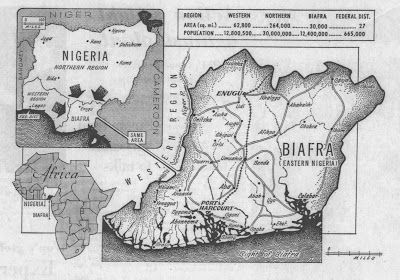Nigeria: The Politics of Ethnicity, Its Impact on Development and Biafra’s Quest for Self-Determination

Undoubtedly, Nigeria has entered a period of political uncertainty. With the next presidential election fast approaching, some politicians and experts are strongly advocating for, among others, a constitutional review considered as the best way to preserve peace and stability in the country. The reviewed constitution will take into account the ethnic diversity and provide for equal representation of southern and eastern regions in the federal system of governance.
In an early September interview, Maazi Oluchi Ibe, a historian and a former lecturer at Gregory University, a private educational institution named after Pope Gregory, located in Uturu, Abia State of Nigeria, talks to Kester Kenn Klomegah, about the political developments, the reasons for economic disparity and the Biafrans’ unquenchable desire for political freedom and self-determination.
Here are the interview excerpts.
***
Kester Kenn Klomegah: Do you consider an urgent constitutional review as the first step towards national integration in the Federal Republic of Nigeria?
Maazi Oluchi Ibe: I think it is better to look at this issue from the perspective of who, in the present-day Nigeria, wants integration. If the Hausa, Fulani, or Yoruba want integration or re-integration for that matter, they are welcomed to it. There is a section of Nigeria that has long gone beyond the idea of integration. That part is the Biafra which has been under forceful military occupation by Nigeria since 1970. Biafra gave Nigeria a clear, unambiguous path to integration at Aburi in 1967. What Biafrans saw clearly in 1967 is what the rest of Nigeria is contemplating today. Biafrans are also telling Nigerians today that that we saw 53 years ago is no longer tenable. Possibly in a couple of decades, Nigeria will wake up to that reality too.
The net minimum for any look at the Nigerian constitution is a simple declaration for a plebiscite amongst the people of Biafra for self-determination. That remains the only basis. However, it is important we let those who feel concerned and who think that a mere constitutional review will solve the Nigerian quagmire, to know that history our guide. Every Nigerian constitution was watered on the blood of Biafrans. From 1945, to as recent as August 25th, 2020 when young Biafrans holding a peaceful meeting were shot to death at Emene Enugu, it has been genocide and countless killings of Biafrans. What then is the guarantee that the next constitutional review will not follow suit?
We will not cease saying that what ails Nigeria is beyond constitution making and reviews. What ails Nigeria is the forceful amalgamation of incompatible entities into a geographical expression. Is it not callous that pre-war Europe made up of multi-ethnic nations who were mired in ceaseless wars until they unbundled through the creation of ethnic nations will turn round in Africa and create exactly what made old Europe unstable for centuries? Even the two Germans that were separated in 1945 have joined back together as one nation. That is the natural order of things. Same Europeans came to African and forced ethnic nation, some as twice the population of an average European nation, into forceful unions with others as large and they think it will stand? No, it will not stand as the former USSR has proved, ditto, Czechoslovakia, Yugoslavia and in Africa, Eritrea, and Sudan. To further muddle the waters, the British allowed two contentious expansionist religions that are almost equal in population to live in one geographical space called Nigeria. What sort of idiotic experiment was that? Imagine what it has caused since 1914 in terms of human lives, mainly the lives of innocent Biafrans. No, it is not a constitutional review matter.
KKK: Why are there rising blatant criticisms about the current constitution adopted in 1999?
MOI: Simply because Nigeria has never had a constitution. Even the so called ‘famed’ 1963 Republican constitution was a gross failure and that was why the army step in a mere three years after its proclamation. The current infamous 1999 constitution was merely a baring of the fangs that in the past were covered with a glove. The ‘good’ thing about this constitution was that its criminal creators did not hide the fact that it was a creation of a military decree. Imagine the impunity and the blood cuddling guts of declaring a military decree as emanating from ‘We the People!’ That very first statement in that piece of paper was and is a blatant lie and they are not hiding the fact.
KKK: What are the narratives and the reasons for underdevelopment in the Biafra State?
MOI: Some of the greatest disaster that befell Biafra from the war of independence were so subtle that an unconscious mind will hardly notice them, while many were so conspicuous that they scream to the high heaves for all to see. For instance, the divide and rule system introduced by the British colonizers where perfected by the Fulani oligarchy that took over Nigeria with Biafrans at the receiving end.
Across a once peaceful land compared to what was obtainable in other sections of Nigeria, the conquering caliphate army imposed all sorts of divisions, ethnic, geographic, demographic, and so on. That is why today, they would rather want Biafrans to fight within themselves over artificial boundaries they created to divide us, like their British did. Such externally imposed divisive tendencies does not call for economic development. But, we are more conscious of such subtleties now.
In addition, there is what Professor Chidi Osuagwu, defined as the deprivation of Knowledge and its concomitant effect over the decades on Biafran economy. Professor Chidi Osuagwu, Federal University of Technology, Owerri, Imo state, had done an article on Igbo deprivations in Nigeria from where the excerpt on the missionary school’s take over came from. Immediately after the war, the Nigerian caliphate government struck at the lifeblood of Biafran development, that is, the Missionary Schools. They took over the mission schools after the war aimed at slowing down and degrading the booming educational Sector in Biafraland that was the driver of Biafran progress. Today, the state of education in Biafraland viz-a-viz what was obtainable pre-Biafran war of independence speaks volume.
By consciously shutting down economic activities in Biafraland through strangulatory policies, significant amongst them the £20 policy, that is, giving Biafrans only £20 without putting into consideration whatever holdings Biafrans held in their prewar bank accounts which the conquering army confiscated. Their nationalization decree of 1972 that turned over all major companies and conglomerated into the Nigerian caliphate governments’ hands. Other examples are the policy of importing from far away Lagos instead of nearby Port Harcourt and other natural seaports available in Biafraland. Mind you, Port Harcourt seaport was opened as far back as 1917, but today lies fallow. The cumulative effect of these policies was the forceful dispersal of Biafran youths from our homeland. Today they remain the largest economic migrant group the whole of Africa.
These glaring constraints naturally forced an implosion leading to insecurities which were in turn blamed on the people and used as an excuse to militarize the land. Biafra is the most militarized region today in West Africa, if not the whole of Africa. Why not militarize the North with an ongoing war that has lasted over ten years?
Let us also not forget that by consciously imposing political leadership akin to the warrant chiefs the British imposed on Biafraland during the colonial period, the present Nigerian system has a grip on what gets done and what does not in Biafraland. What brings home the truth of the parlous economic situation in Biafraland today is not to compare it with what obtains in Northern Nigeria but to recall the fact the pre 1967 economic indices showed the then Eastern region (Biafra) as the fastest developing economy in the world.
KKK: How do you envisage women’s role in the current struggle for freedom, peace, and development in Biafra State?
MOI: Biafran women are the most resilient in Africa if not world over. Possibly no other group of women have passed through what they did and are still passing through in contemporary history. These were women who lost children, siblings, husbands, fathers, and mothers in the genocidal war Nigeria imposed on Biafra in 1967. 53 years after they are still forced to endure rapine, and harassment in their very homes and farms by terrorist herdsmen buoyed by Nigerian government. Yes, they are very patient but whenever their patience dissipates as it has, you are going to be confronted with a different level of struggle. No other people know this more than the British who thinking that Biafran women were as docile as their British counterpart of the early 20th century crossed the invisible line. The now famous Aba women war of 1929, remember was fought solely by Biafran women based on same issues as has been confronting their nation since 1970.
It is only in this part of the world that you have women having equal if not superior rights to men. That was why when confronted by the British judicial panel over the Aba women’s war, on why the women listened to their menfolk and went on rampage, the angry women leaders of the revolution had retorted, ‘here, men do not speak for us!’ This, when published in the British press in the 1930s was picked up by British women suffragettes and became their catchphrase, ‘here men do not speak for us, as reported by Harry Gailey. Gailey authored “The Road to Aba: A Study of British Administrative Policy in Eastern Nigeria” and was published by New York University Press in 1970.
KKK: Is human rights violations becoming a thorny issue in Nigeria? Why armed northern Islamic attacks on Christian-dominated southwestern and southeastern States?
MOI: Human rights violations and armed Northern Islamic attacks on Christians have gone beyond the description, ‘thorny.’ It is now an existential threat. It is a choreographed, preplanned attempt at not just ethnic cleansing but a grand Islamization conquest in their quest to ‘deep the Koran into the Atlantic,’ as promised them by their forebears. This is happening with impunity with tens of thousands killed as the world watch without lifting a finger. What did we do? Is it wrong to be Christian and Biafran? What makes our own Christianity different from that of the rest of the world that they have refused to help? How come all the international news media have refused mentioning the daily carnage? Who says Biafra with its 95% Christian population, an ancient democratic and republican system, sharing the best of contemporary Western ideas cannot be helped to be a bastion against militant Islamism that poses a great threat not just to Biafrans but the rest of the world? It is unbelievable.
KKK: Does Buhari’s administration recognize all the issues you have discussed above?
MOI: How can someone who subscribes to the philosophy that ‘Western knowledge’ is bad recognize any of these issues? These issues are diametrically opposed to his ideals and what he has come to execute. He has been sincere in stating, in clear terms, all he has been doing are pro-militant Islam and anti-westernization and modernity. Buhari’s administration is completely blind to these important facts. The federal government would rather exacerbate them than otherwise.
KKK: What are the expectations from regional organizations, especially the Economic Community of West African States (ECOWAS), and of course, the African Union?
MOI: They do not exist. There is no point wasting energy on things that do not exist unless we want to get entangled in an empty academic exercise. When last for instance did ECOWAS or African union make a statement on the daily bloodshed in Nigeria?
Unfortunately for ECOWAS, Africa and the Western world that have refused to raise a finger and are all seating on the sideline waiting for Nigeria to implode, that implosion will come sooner or later and when 200 million refuges start streaming all over Africa and into the Western world, a world that could not handle six million Syrian refuges, maybe, then all our eyes will open. This is the time for the world to halt the recalcitrant marauding Nigerian legal and illegal security forces bent on decapitating everything on their path to the total domination of our space.
This is the time for the world to force Nigeria to a round table. This forced amalgamation of 1914 has not worked and will never work. Our situation is not that of a window dressed constitutional review. We are all worlds apart. There is simply two diametrically opposed cosmological views that cannot live side by side in this space. It happened in India and in 1947/8, the British did the right thing – separated Hindu India and Islamic Pakistan. That right thing – separation, is our minimum demand.
*
Note to readers: please click the share buttons above or below. Forward this article to your email lists. Crosspost on your blog site, internet forums. etc.
Kester Kenn Klomegah is a passionate and frequent contributor to Global Research.



